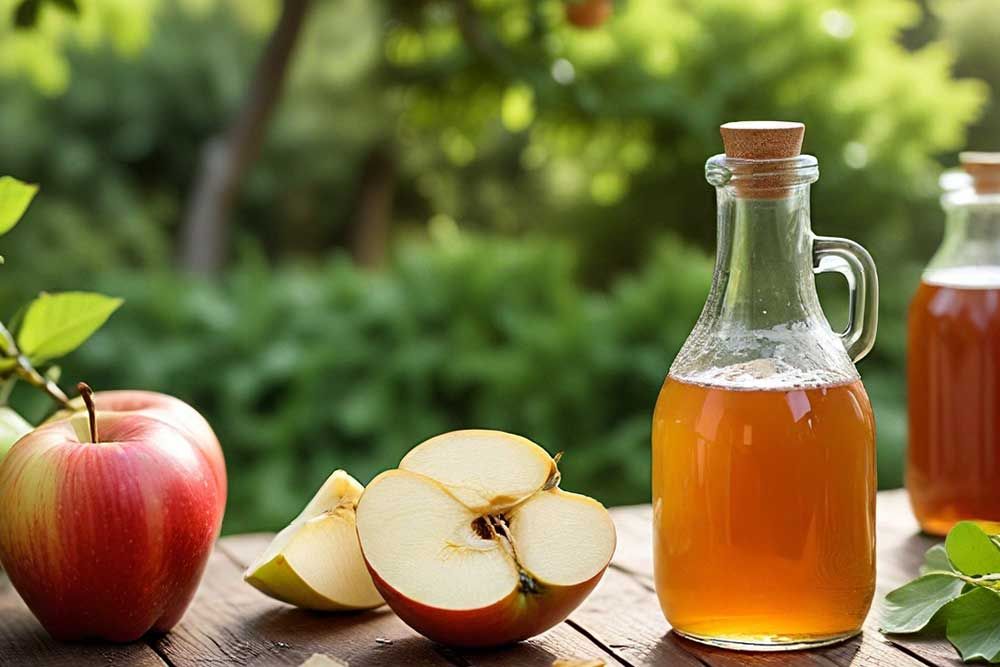Age spots, also known as hyperpigmentation, are flat, dark areas on the skin generally caused by sun exposure. They occur due to excess melanin production in the skin, triggered by prolonged UV light exposure over time. While they are commonly spotted among people over the age of 50, anybody can get them. Fortunately, these spots are harmless and can be lightened and managed using home remedies like apple cider vinegar.
How does apple cider vinegar help?
Apple cider vinegar (or ACV) contains acetic acid, which is well-renowned for its antifungal and antibacterial properties. It also contains alpha hydroxy acids (AHAs), such as citric, lactic, and malic acids, which help exfoliate the top layers of the skin without too much effort to impart a natural glow. Lastly, ACV contains phenolic compounds that have antioxidant properties.
Thanks to these ingredients, apple cider vinegar can be instrumental in helping people deal with acne, reduce hyperpigmentation, restore dull skin, balance skin pH, and smoothen wrinkles.
Skin hyperpigmentation or age spots that have been caused by excess melanin production can be managed using apple cider vinegar thanks to its AHA compounds. Malic acid, specifically, may help lighten brown spots, while citric acid can improve cell turnover, to decrease the appearance of age spots.
Using apple cider vinegar to remove age spots
Apple cider vinegar is a potent solution, which is why it must never be used as is. This is because it could lead to irritation and chemical burns on the skin. Depending on the solution and method of application, it can be used in a myriad of ways.
ACV face wash
Using a face wash is a common part of most people’s skincare routine to get rid of any dead skin, dirt, and oils on the face. One simple way of adding ACV into one’s life is by switching out their regular face wash for an ACV wash.
This wash requires a solution made with a tablespoon of apple cider vinegar and a quarter cup of water. Mix this well, and apply it using a soft washcloth to gently cleanse and exfoliate the skin. Rinse and moisturize well.
ACV toner
The highly acidic content in ACV makes it a brilliant astringent, fighting impurities like bacteria on the skin. That is why it can also be used as a toner.
Prepare a solution of one part apple cider vinegar with two parts water, and pour this into a spray bottle for ease of use. Apply it with a cotton ball to certain areas of the face, or spritz it on after washing it for even dispersion. Leave it on for a minute, and then wipe clean. Follow it up with a good moisturizer.
Over time, this waiting period can be ramped up to 15 minutes, but experts do not recommend leaving it on for longer. Try to use this 1-3 times a week, depending on the skin’s reaction to it.
ACV spot treatment
Often, blemishes may appear out of nowhere. These can be managed by applying ACV as a spot treatment. It’s best to start with a 1:1 solution of ACV and water and apply it to the spots using a cotton ball or swab. Let it sit for a few minutes before rinsing it off with lukewarm water.
ACV face masks and scrubs
Alternatively, one can also make and use face masks with ACV to brighten their skin and reduce the appearance of age spots.
- ACV and honey – Mix equal parts apple cider vinegar and honey, and apply it to the face. Leave it on for 15-20 minutes before washing it off.
- ACV and baking soda – Make a paste using ACV and baking soda. Use this to scrub the affected area of the skin and exfoliate well. Rinse it off, and moisturize.
- ACV and green tea – Make a toner that’s loaded with antioxidants. Start by steeping some green tea, and letting it cool down to room temperature. Then, mix equal parts of tea and apple cider vinegar, and spritz it on the skin.
Given ACV’s potency, it is best if those with sensitive skin, open cuts, or other skin conditions use a more diluted solution, or entirely steer clear of using it. To know how it will react with the skin, start with a small patch test. Wait for a few hours to check how the skin responds, before proceeding to use it to reduce age spots.
Other home remedies to reduce age spots
While apple cider vinegar is a stellar ingredient in the fight against age spots, it may not be suitable for everyone. Thankfully, there are many other remedies available, such as:
Aloe vera gel
Apply fresh aloe vera juice or gel directly on age spots, and leave it on for 30 minutes. This hydrating ingredient is less likely to cause irritation and leave the skin feeling brighter and smoother. Rinse it off, and follow it up with a moisturizer.
Castor oil
Take a tiny amount of castor oil, and massage it directly on the spots for a few minutes, until absorbed. Repeat this twice a day for best results.
Lemons
This fruit contains citric acid, which may help naturally bleach age spots. Apply a slice of lemon directly on the skin, or dilute some of its juice with water, and use it on the spots once or twice a day. Rinse well and moisturize afterward.
Watermelon rind
Don’t let that watermelon rind go to waste! Rub it on the skin to reduce dark spots, and wash it off with lukewarm water. Don’t forget to moisturize.
